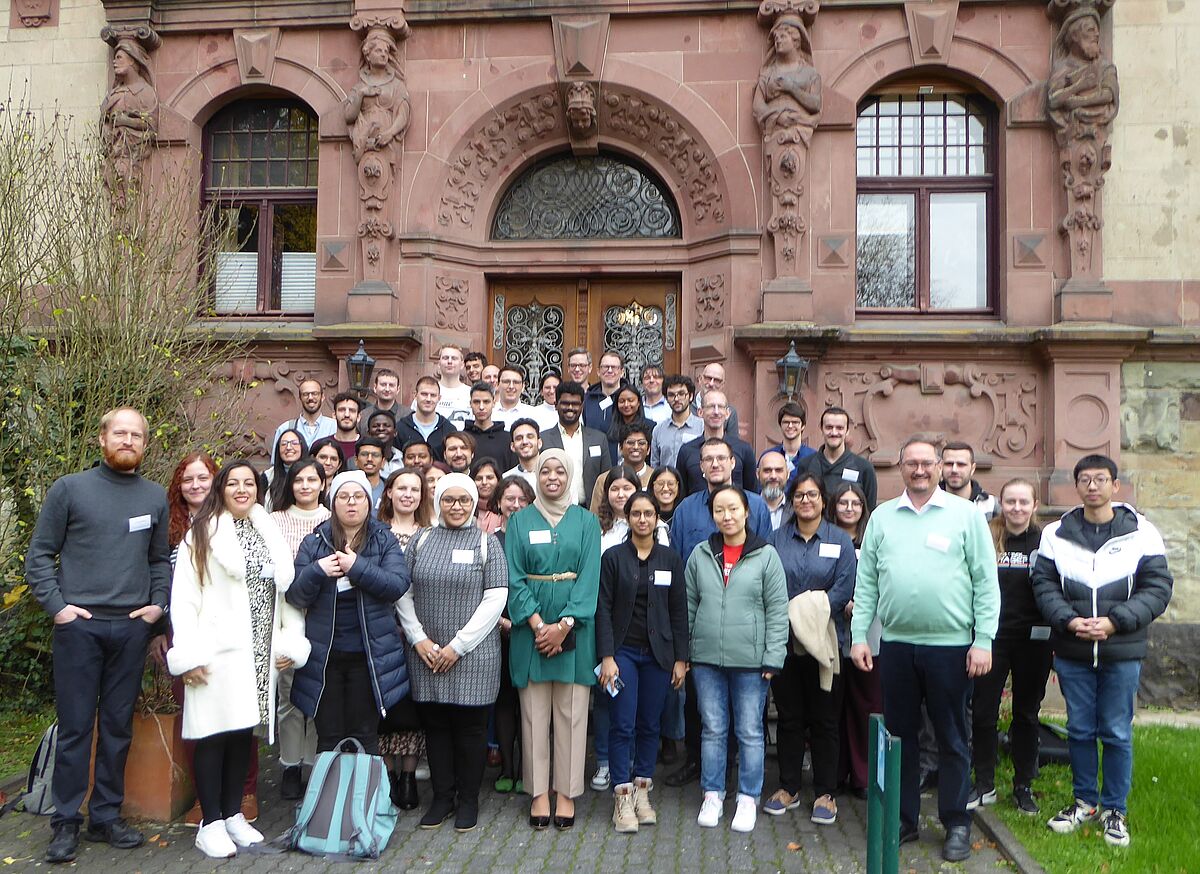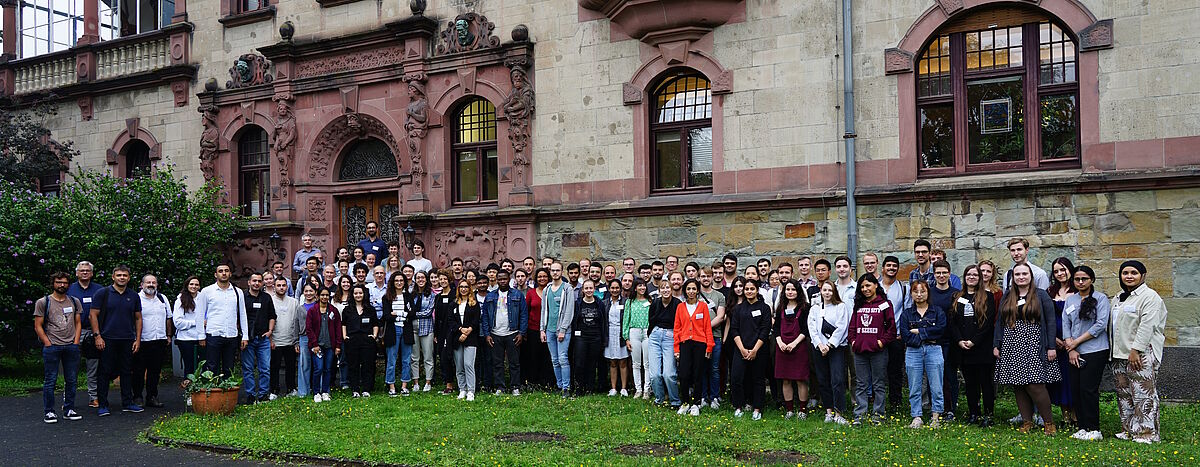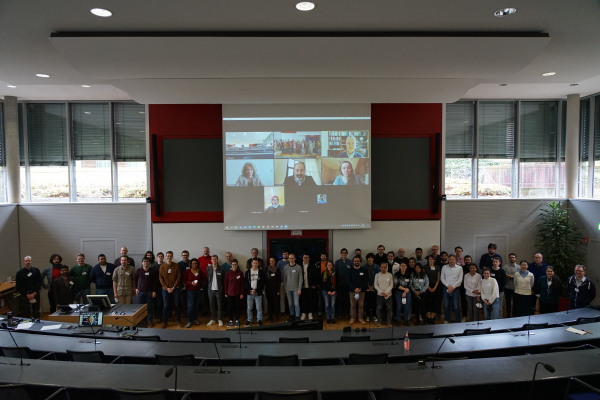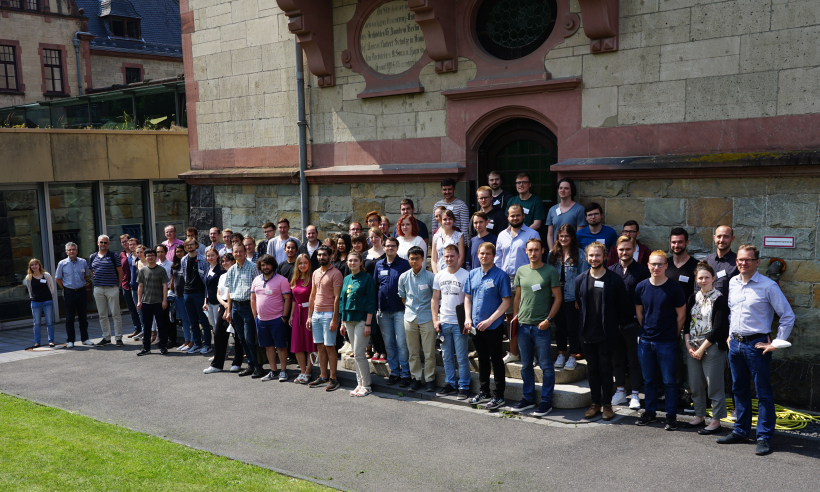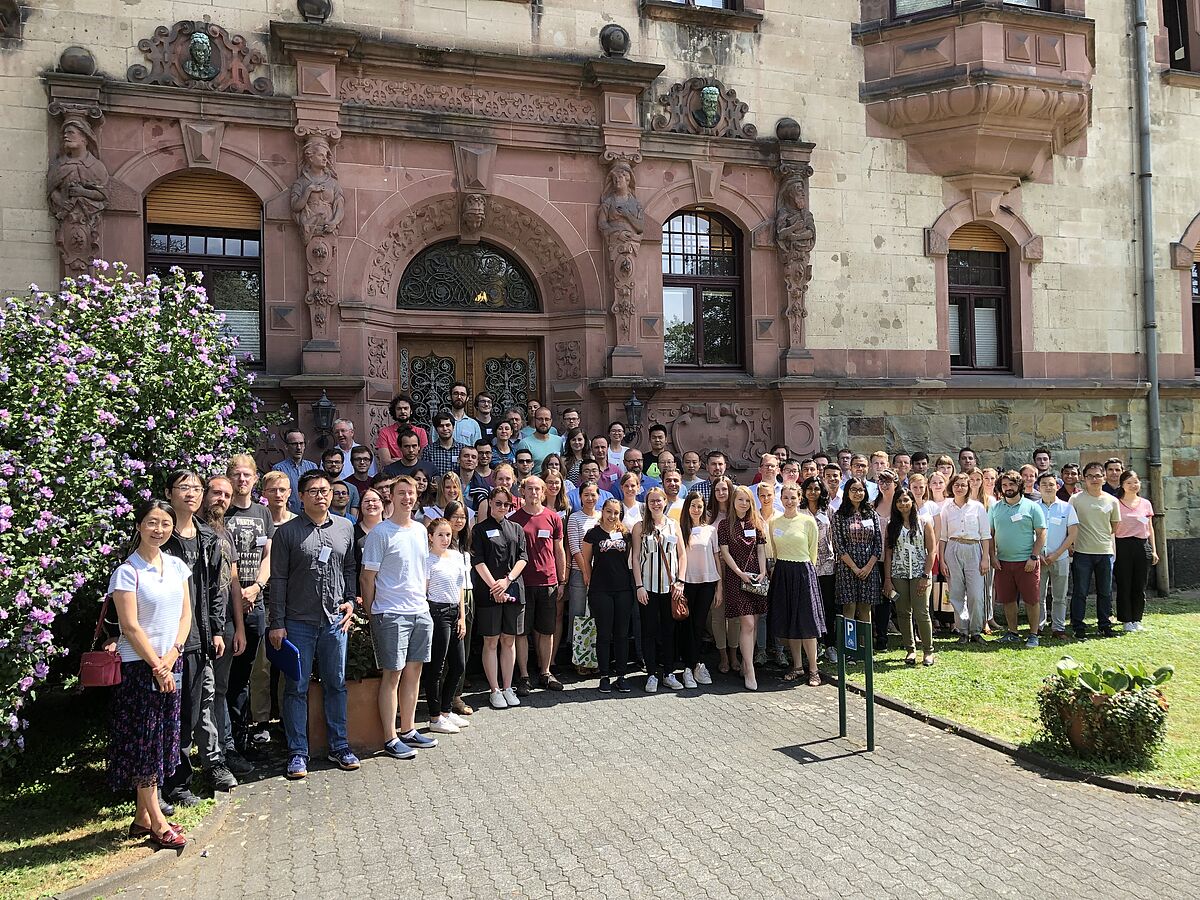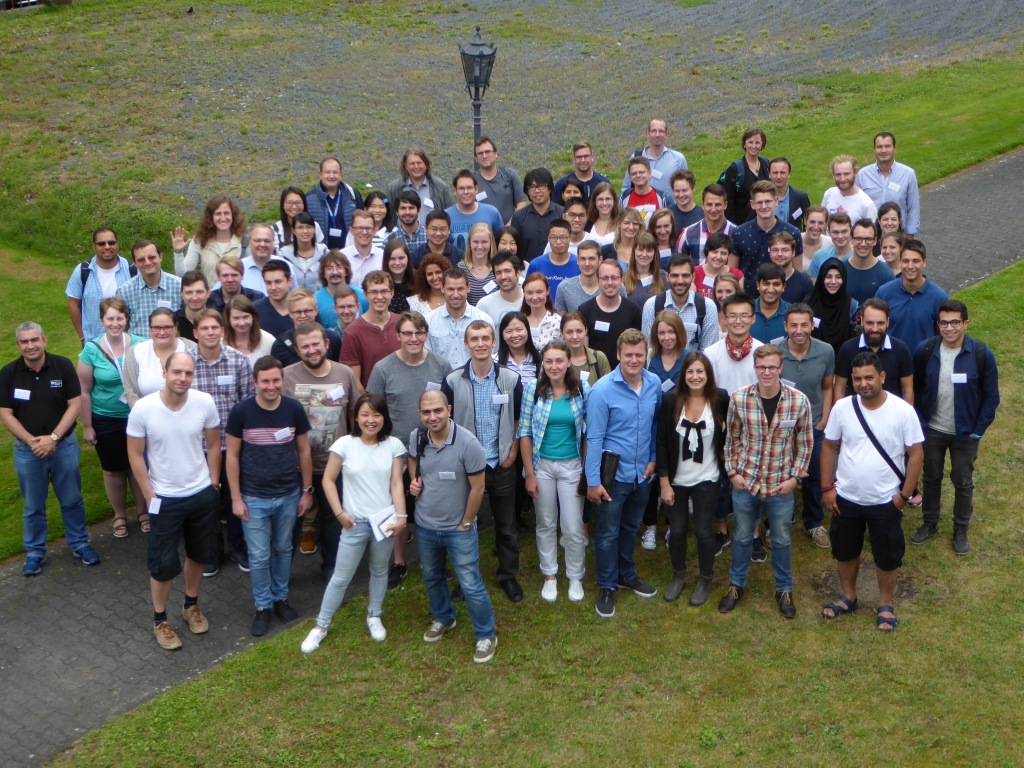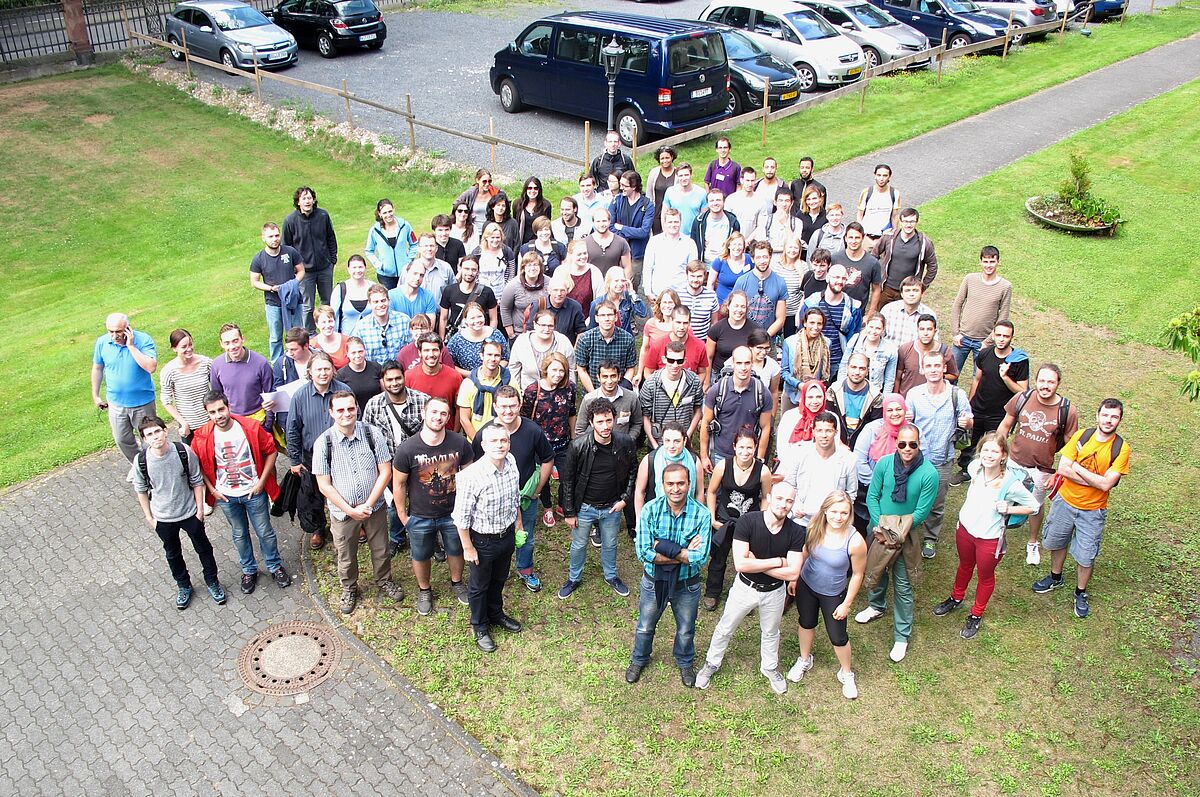Conference 2026
WE-Heraeus-Seminar on
Charge transport on ultra-short length and time scales
Supported by the Wilhelm and Else Heraeus Foundation
Organized by Christian Klinke (University of Rostock)
and Marcus Scheele (University of Tübingen)
9th to 11th February 2026, Physikzentrum Bad Honnef, Germany
Synopsis
Advances in semiconductor-based sensing and computing will require new materials with superior properties. To meet the demands of future devices the supremacy of relevant materials lies in the field of ultra-short length scales and ultra-fast time scales. This seminar will explore new approaches in fabrication, characterization and development of quantum-confined solid-state materials. In interdisciplinary exchange, the participants will discuss the goals for future devices, new exploitable effects, and instrumental advances. Experts from different fields such as physics, chemistry and materials science will come together to synergistically address the challenges in the application of nanomaterials for optoelectronics.
With the advent of large-language models, cloud computing, and the exponential growth in data transmission, miniaturizing components for Information and Communication Technology (ICT) has become a key strategy in semiconductor physics. Another promising approach involves integrating qualitatively different materials into the core of these devices. Such materials can save energy through miniaturization, speed up processes due to higher mobilities, and operate on new physical principles like spintronics. Future information processing and transmission will necessitate significant improvements in the efficiency of their key components to balance the increasing demand for ICT applications. Nanotechnology and the fabrication of device components confined in one, two, or even three dimensions have been at the forefront of providing solutions to this challenge.
The seminar will focus on electronic and optoelectronic transport in nanomaterials, detailed characterization techniques, and will provide insights into theoretical understanding and modeling of nanoscale materials. While most relevant materials in this context are semiconductors, the seminar will also cover plasmonic nanomaterials to improve semiconductor applications through electromagnetic field enhancement. The overarching goal of the seminar is to bring together scientists working at the forefront of semiconductor research to collaboratively develop nanotechnological solutions for faster and more energy-efficient device physics to be ready for the future.
Confirmed invited speakers
Helene Seiler (FU Berlin), Eleftherios Goulimakis (University of Rostock), Claudia Draxl (HU Berlin), Claus Ropers (MPI Göttingen), Sascha Feldmann (EPF Lausanne), Bridget Murphy (University of Kiel & DESY), Jannika Lauth (University of Tübingen & Hannover), Andres Castellanos Gomez (ICMM-CSIC Madrid), Stefan Mathias (University of Göttingen), Isabelle Staude (University of Jena).
Further details: 848. WE-Heraeus-Seminar
Summer School 2025
Bad Honnef Physics School on
Exciting nanostructures:
Characterizing advanced confined systems
Supported by the Wilhelm and Else Heraeus Foundation and the DPG
Organized by Christian Klinke (University of Rostock)
and Sandrine Ithurria (ESPCI Paris)
13 - 18 July 2025, Physikzentrum Bad Honnef, Germany
Synopsis
The developments in our society in terms of computing power, sensing, and alternative energy demand new generations of building blocks for future optical and electrical applications with higher efficiencies and lower costs. In the recent years, enormous progress has been made in defining nanostructures and in understanding their physical properties. Nowadays, it is possible not only to prepare spherical, zero-dimensional nanoparticles, but also one-dimensional nanorods, two-dimensional nanosheets and hybrid materials. Structural design aims on developing of sophisticated nanoparticles architectures, doped materials, and materials with specifically modified surfaces. Shape and structure have a strong influence on their physical properties, which results mainly from their large surface-to-volume ratio and/or from the quantum confinement of their electrons and holes – but also plasmonic effects play a big role. The nanoobjects of various shapes can be further utilized as building blocks for even more sophisticated 2D or 3D assemblies.
In this summer school the basics of the preparation of nanostructures, the resulting physical properties, their optoelectronic applications, and theoretical methods will be reviewed. A range of characterization techniques with a special emphasis on spectroscopy will be introduced. The summer school provides an ideal forum for Master and PhD students to become acquainted with the topic and to initiate further discussions. The participants are expected to present their own work in the form of posters and are given the chance to introduce it also in the form of flash presentations. We will invite leading experts in nanostructure preparation, spectroscopy, electrical transport, and related fields.
Confirmed invited speakers
Alexander Eychmüller (TU Dresden), Mischa Bonn (MPI Mainz), Ivan Infante (BCMaterials), Beatriz Juarez (CSIC Madrid), Marcus Scheele (University of Tübingen), Celso Demello Donega (Utrecht University), Christophe Coperet (ETH Zurich), Juan Ignacio Climente (University Jaume I), Lorenz Kienle (University of Kiel), Andrei Petukhov (Utrecht University), Nahid Talebi (University of Kiel), Moritz Kühnel (University of Hohenheim).
Further details: DPG Bad Honnef Physics Schools
Research Conference 2024
WE-Heraeus-Seminar on
Uniting Today’s Nanotechnology for Advancing Tomorrow’s Semiconductor Physics
Supported by the Wilhelm and Else Heraeus Foundation
Organized by Christian Klinke (University of Rostock)
and Marcus Scheele (University of Tübingen)
13 - 15 November 2024, Physikzentrum Bad Honnef, Germany
Synopsis
This seminar discusses advances in the fabrication and optoelectronic properties of quantum-confined solid-state materials from the two viewpoints of bottom-up (e.g. wet-chemistry or molecular beam epitaxy) vs. top-down methods. The overarching hypothesis is that these communities, which currently act largely separately due to the different chemical approaches, face many identical physical challenges in the application of these nanomaterials for optoelectronics, such that an interdisciplinary exchange holds for a high degree of synergy.
With the advent of cryptocurrency mining, the wide-spread utilization of pretrained text generators and a superlinear growth in transmitted data volume, miniaturization of components for Information and Communication Technology (ICT) is a major challenge for semiconductor physics. It is anticipated that the world-wide electricity consumption due to ICT will exceed 10% in 2025, which requires major improvements in the energy efficiency of their key components to balance the growing demand for ICT applications with its energy consumption. Nanotechnology and the fabrication of device components with spatial confinement in one, two or even three dimensions has been at the forefront of providing solutions to this challenge. The seminar will focus on transport and optics in nanomaterials, detail characterization techniques and provide insights into a theoretical understanding and modelling of nanoscalic materials. While most materials of relevance in the context are semiconductors, the seminar will also include plasmonic nanomaterials, for instance to improve semiconducting applications by electromagnetic field enhancement. The overall goal of the seminar is to unite the top-down with the bottom-up nanofabrication community to jointly develop nanotechnological solutions for a faster and more energy- efficient device physics of the future.
Invited Speakers
Klaus Ensslin (ETH Zurich), Monika Fleischer (U Tübingen), Andreas Fery (Leibniz Dresden), Sandrine Ithurria (ESPCI Paris), Ute Kaiser (U Ulm), Iwan Moreels (Ghent U), Nahid Talepi (U Kiel), Ferry Prins (ICMM CSIC Madrid), Gianaurelio Cuniberti (TU Dresden), Ivan Infante (BC Materials, Leioa), Thomas Heine (TU Dresden)
Further details: WE Heraeus Stiftung
Summer School 2023
Bad Honnef Physics School on
Exciting nanostructures:
Characterizing advanced confined systems
Supported by the Wilhelm and Else Heraeus Foundation and the DPG
Organized by Christian Klinke (University of Rostock)
and Nikolai Gaponik (TU Dresden)
30 July - 4 August 2023, Physikzentrum Bad Honnef, Germany
Synopsis
The developments in our society in terms of computing power, sensing, and alternative energy demand new generations of building blocks for future optical and electrical applications with higher efficiencies and lower costs. In the recent years, enormous progress has been made in defining nanostructures and in understanding their physical properties. Nowadays, it is possible not only to prepare spherical, zero-dimensional nanoparticles, but also one-dimensional nanorods, two-dimensional nanosheets and hybrid materials. Structural design aims on developing of sophisticated core-shell and Janus nanoparticles, doped materials, and materials with specifically modified surfaces. Shape and structure have a strong influence on their physical properties, which results mainly from their large surface-to-volume ratio and/or from the quantum confinement of their electrons and holes – but also plasmonic effects play a big role. The nanoobjects of various shapes can be further utilized as building blocks for even more sophisticated 2D or 3D assemblies.
In this summer school the basics of the preparation of nanostructures, the resulting physical properties, their optoelectronic applications, and theoretical methods will be reviewed. A range of characterization techniques with a special emphasis on spectroscopy will be introduced. The summer school provides an ideal forum for Master and PhD students to become acquainted with the topic and to initiate further discussions. The participants are expected to present their own work in the form of posters and are given the chance to introduce it also in the form of flash presentations. We will invite leading experts in nanostructure preparation, spectroscopy, electrical transport, and related fields.
Invited speakers
Jochen Feldmann (LMU Munich): Colloidal Nanocrystals and Light
Steven Erwin (US Naval Research Laboratory): Theory and Computation of Semiconductor Nanostructures
Iwan Moreels (Ghent U): Shape Control in the Colloidal Nanocrystal Synthesis
Iwan Moreels (Ghent U): Synthesis and Optoelectronic Properties of 2D Colloidal Nanocrystals
Jannika Lauth (U Tübingen): Testing without Touching: Time-Resolved Terahertz-Spectroscopy for Nanostructures
Dmitri Talapin (U Chicago): The Surface Science of Nanocrystals and MXenes
Celso de Mello Donega (U Utrecht): Beyond Conventional Quantum Dots
Maksym Kovalenko (ETH Zurich): Highly Luminescent Lead Halide Perovskite Nanocrystals
Maria Ibanez (IST Austria): Thermoelectric Transport
Christian Würth (BAM Berlin): Spectroscopic characterization of luminescent nanomaterials
Hilmi Volkan Demir (Bilkent U): Semiconductor Nanocrystal Optoelectronics for Lighting and Displays
Ryan Crisp (FAU Erlangen): Nanomaterials for Light Harvesting
Elena Shornikova (U Dortmund): Magnetooptics of Nanostructures
Ivan Zaluzhnyy (U Tübingen): X-ray diffraction with spatial resolution
Vanni Lughi (U Trieste): Engineering (with) Nanoparticles
Research Conference 2022
WE-Heraeus-Seminar on
Optoelectronic Processes at Nanostructured Interfaces
Supported by the Wilhelm and Else Heraeus Foundation
Organized by Christian Klinke (University of Rostock)
and Marcus Scheele (University of Tübingen)
14 - 16 March 2022, Physikzentrum Bad Honnef, Germany
Synopsis
The growing demand for higher computing power, more selective sensing, and alternative energy production requires new generations of materials for future optical and electrical devices with higher efficiencies and lower costs. The development of such devices is expected to enable a broad range of electronic applications amongst which are LEDs both for lighting and for displays, batteries and capacitors, highly selective catalysts and electrocatalysts, sensors and photodetectors, and many more. For that purpose, nanostructured materials can be exploited in solution or in the solid state, for instance as thin films, either pure or as combinations by self-assembly. Due to the ongoing miniaturization and the use of nanomaterials and with this the increased surface-to-volume ratio the interfaces gain more and more relevance. Eventually, an understanding of the materials’ interface properties is essential for their application in high-performance devices. Further, tailoring and controlling the electronic structure at the interface has a profound impact on their optoelectronic properties.
Invited Speakers
- Bettina Lotsch, MPI for Solid State Research Stuttgart, Germany
- Jannika Lauth, University of Hannover, Germany
- Thomas Frauenheim, University of Bremen, Germany
- Tobias Kipp, University of Hamburg, Germany
- Andres Castellanos-Gomez, CSIC Instituto de Ciencia de Materiales de Madrid, Spain
- Jana Zaumseil, University of Heidelberg, Germany
- Hilmi Volkan Demir, Bilkent University Ankara, Turkey
- Julia Stähler, Humboldt University Berlin, Germany
- Emmanuel Lhuillier, Sorbonne Université Paris, France
- Alexander Holleitner, Technical University Munich, Germany
Summer School 2021
Bad Honnef Physics School on
Exciting nanostructures:
Characterizing advanced confined systems
Supported by the Wilhelm and Else Heraeus Foundation and the DPG
Organized by Christian Klinke (University of Rostock)
and Nikolai Gaponik (TU Dresden)
18 - 23 July 2021, Physikzentrum Bad Honnef, Germany
Speakers and their topics
Horst Weller (University of Hamburg): Nanocrystals: what was, what is and what might be
David J. Norris (ETH Zurich): Can we synthesize colloidal quantum dots that are all the same size?
David J. Norris (ETH Zurich): The history of doping in semiconductor nanocrystals
Jan-Ole Joswig (TU Dresden): Computational-chemistry approaches to modelling nanostructures and their properties
Sandrine Ithurria (ESPCI Paris): Two-dimensional nanostructures: Control the inorganic core and the surface chemistry
Andres Castellanos (CSIC Madrid):Tutorial on the fabrication of electronic nano- and micro-devices
Andres Castellanos (CSIC Madrid): Electronic transport through nanostructures: example of two-dimensional materials
Tobias Korn (University of Rostock): Optical spectroscopy of two-dimensional materials
Jannika Lauth (University of Hannover): Testing without Touching: Time-Resolved Terahertz-Spectroscopy for Nanostructures
Nadja Bigall (University of Hannover): Principles of nanocrystal assembly
Marcus Scheele (University of Tübingen): X-ray methods for nanostructures
Dmitri Talapin (University of Chicago): Charge and heat transport in nanocrystal arrays
Elena Shornikova (TU Dortmund): Magnetooptics of colloidal nanocrystals
Johannes Barth (TU Munich): Coordination chemistry at interfaces and the engineering of low-dimensional metal-organic nanosystems
Ryan Crisp (University of Erlangen): Enhancing the properties of colloidal semiconductor quantum dots to empower solar cells and photoelectrochemical devices
NANOPLUS 2020
First virtual conference on solution-based optoelectronic nanomaterials
Thursday April 30, 2020, 3 pm to 7 pm CEST (Central European Summer Time)
Organized by Christian Klinke
Synopsis
Solution synthesized and processable nanostructures become increasingly important. The materials are intriguing from a fundamental point of view with many potential insights in terms of chemical synthesis and physical characterization, but also real-world applications appear at the horizon. Their extraordinary electronic, phononic, optical and mechanical properties make them promising materials for a myriad of applications (spintronic devices, field-effect transistors, nanoscale sensors, batteries, inexpensive photodetectors, LEDs, and lasers). This virtual conference is a new approach to bring together the multidisciplinary scientific community working on the synthesis, the physics and applications in devices. Keynote speakers are Prof. Horst Weller from the University of Hamburg and Prof. David Norris from the ETH Zurich.
Program
Keynote: Prof. Horst Weller (University of Hamburg and Fraunhofer Center for Applied Nanotechnology)
Tailor-made synthesis and surface modifications of nanocrystals for applications in materials and life sciences
Contributed talk: Prof. Iwan Moreels (Ghent University)
Multiphoton Fluorescence Upconversion with Heterostructured 2D Colloidal Nanocrystals
Contributed talk: Dr. Marcus Scheele (University of Tübingen)
Structural order matters: Enhanced electronic coupling in self-assembled micro-crystals of Au-nanoclusters
Keynote: Prof. David Norris (ETH Zurich)
Monodisperse Semiconductor Nanocrystals: Is It Possible?
Contributed talk: Dr. Andreas Riedinger (Max Planck Institute for Polymer Research Mainz)
Kinetic Control over Self-Assembly of Semiconductor Nanoplatelets
Contributed talk: Dr. Clara García-Astrain (CICBiomagune San Sebastian)
3D Printed plasmonic scaffolds for SERS sensing
Contributed talk: Prof. Tobias Hanrath (Cornell University Ithaca)
Quantum Dot Solids: From Fundamental Insights into Assembly and Attachment Mechanism
Towards Fabrication of Complex Hierarchical Superstructures and Enabled Applications
Flash talks:
Klaus Boldt (University of Konstanz): Quantification of Material Gradients in Core/Shell Nanocrystals
Chris Rehhagen (University of Rostock): Ultrafast Spectroscopy of Organic Nanoparticles
Mathias Charconnet (CIC biomaGUNE): Fabrication and optical characterization of gold nanoparticle superlattices
Sonja Krohn (Fraunhofer IAP-CAN): Highly reproducible CdSe/CdS giant-shelled nanocrystal synthesis with tunable particle geometry
Prachi Rastogi (Sorbonne Université): Towards Infrared detection in perovskite nanocrystals film via PbS nanocrystals doping
Guillaume Gouget (University of Pennsylvania): Rare-earth oxychlorides from colloidal synthesis: a pathway to isotropic nanocrystals with efficient photoluminescence
Dmitry Baranov (Italian Institute of Technology): Developing CsPb(I1-xBrx)3 perovskite nanocrystal superlattices: structural coherence, tunable emission, and photo(in)stability
Cristina De La Encarnacion Bermudez (CIC biomaGUNE): Magneto-plasmonic nanoparticles for multimodal bioimaging
Burak Guzelturk (Argonne National Laboratory): Efficient optical gain in colloidal nanocrystals
Ahmad Kirmani (National Renewable Energy Laboratory, NREL): Colloidal quantum dot photovoltaics on the road to scalable fabrication
Jaco Geuchies (Delft University of Technology): Quantitative electrochemical control over optical gain in quantum-dot solids
Summer School 2019
Bad Honnef Physics School on
Exciting nanostructures:
Characterizing advanced confined systems
Supported by the Wilhelm and Else Heraeus Foundation and the DPG
Organized by Christian Klinke (University of Rostock)
and Nikolai Gaponik (University of Dresden)
22 - 26 July, 2019, Physikzentrum Bad Honnef, Germany
Speakers and their topics
Alexander Eychmüller (TU Dresden): My history of colloidal nanostructures
David J. Norris (ETH Zurich): Can we synthesize colloidal quantum dots that are all the same size?
David J. Norris (ETH Zurich): The history of doping in semiconductor nanocrystals
Sandrine Ithurria (ESPCI Paris): Control the shape of semicondcutor colloidal nanocrystals
Andres Castellanos (CSIC Instituto de Ciencia de los Materiales de Madrid): Tutorial on 2D based nanodevices
Vladimir Lesnyak (TU Dresden): Polymer-nanomaterial composites: Preparation, properties, applications
Vladimir Lesnyak (TU Dresden): Chemical transformations of colloidal nanomaterials
Alexander Efros (US Naval Research Laboratory): Optical properties of colloidal nanostructures
Sergey V. Gaponenko (Academy of Science Belarus): Principles of optical spectroscopy of nanostructures
Roberto Otero (IMDEA Madrid): Exciting quasiparticles at the nanoscale by scanning tunneling microscopy
Stephen Hickey (University of Bradford): Basics of spectroscopic electrochemistry with nanoparticles
Zeger Hens (University of Gent): The physics and chemistry of nanocrystal surfaces
Beatriz H. Juarez (IMDEA Madrid): Luminescence nanothermometry with semiconductor nanoparticles
Ute Resch-Genger (BAM Berlin): Advanced characterization of nanomaterials
Summer School 2017
International WE-Heraeus-Physics School on
Exciting nanostructures:
Probing and tuning the electronic properties of confined systems
Supported by the Wilhelm and Else Heraeus Foundation
Organized by Christian Klinke (University of Hamburg)
and Nikolai Gaponik (University of Dresden)
17 - 21 July, 2017, Physikzentrum Bad Honnef, Germany
Speakers and their topics
Sandrine Lhuillier-Ithurria: Synthesis principles of advanced colloidal nanostructures (PDF)
Nadja Bigall: Properties of assembled nanoparticles (PDF)
Hilmi Volkan Demir: Quantum dots in solid state lighting and displays (PDF)
Marcus Scheele: Electronic transport through nanostructures (PDF)
Alfred Meixner: Optical and electronic properties of single nanostructures (PDF)
Alfred Meixner: Optical super-resolution microscopy (PDF)
Stephen Hickey: Spectroscopic electrochemistry with nanoparticles (PDF)
Gabriel Bester: Methods to access nanostructures theoretically
Michael Thorwart: Theory of electronic transport through nanostructures (PDF)
Jochen Feldmann: Advanced optical properties of nanostructures
Dirk Dorfs: Alternative plasmonic materials (PDF)
Summer School 2015
Bad Honnef Physics School on
Physical properties of nanoparticles: Characterization and applications
Supported by the Wilhelm and Else Heraeus Foundation
Organized by Christian Klinke (University of Hamburg) and Nikolai Gaponik (University of Dresden)
26 - 31 July, 2015, Physikzentrum Bad Honnef, Germany
Speakers and their topics
Marcus Bäumer (University of Bremen): Nanoparticles in catalysis
Andreu Cabot (University of Barcelona): Colloidal Nanoparticles for Solar Energy Conversion (PDF)
Tristan Cren (Sorbonne University Paris): Tunneling spectroscopy of individual nanoparticles (PDF)
Jochen Feldmann (LMU Munich): Nanoparticle optics
Nikolai Gaponik (University of Dresden): Aerogels from Nanoparticles (PDF)
Steven Hickey (University of Bradford): Nanoparticles in electrochemistry (PDF)
Ana Hungria (University of Cadiz): Nanoparticle analysis with TEM methods (PDF)
Beatriz H. Juarez (Universidad Autonoma de Madrid): Synthesis of nanoparticles (PDF)
Christian Klinke (University of Hamburg): Electrical transport through monolayers of colloidal nanoparticles (PDF)
Maksym Kovalenko (ETH Zurich): Precisely Engineered Colloidal Nanomaterials for rechargeable Li-, Na- and Mg-ion batteries (PDF)
Liberato Manna (IIT Genoa): Colloidal Inorganic Nanocrystals and Their Transformations (PDF)
Alf Mews (University of Hamburg): Fluorescence blinking of individual semiconductor nanocrystals, nanorods and nanowires (PDF)
Romain Quidant (ICFO Barcelona): Novel nano-optical tools for the detection and manipulation of biomolecules
Marcus Scheele (University of Tübingen): Charge-Carrier Transport in Quantum Dot Solids (PDF)
Marcus Scheele (University of Tübingen): Fundamentals of Bulk Nanostructured Thermoelectrics (PDF)
Daniel Vanmaekelbergh (University of Utrecht): Self-assembly of colloidal nanocrystals as route to novel classes of nanostructured materials (PDF)

